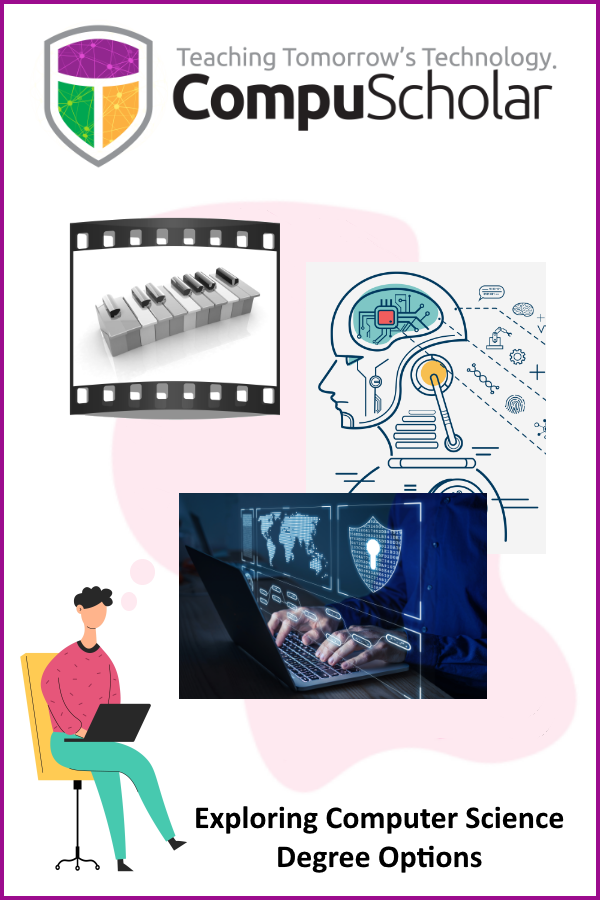
Students interested in coding as a career face will normally go to college for a Bachelor's Degree as a first step. When you survey college websites for B.S. degree options, you will find many degrees with names that sound similar. Which type of degree is the best fit for student interests? Let's see what each degree name normally means.
These representative degree names were chosen after surveying a variety of college websites, but actual names at different schools may vary!
STANDARD "COMPUTER SCIENCE" DEGREES
Most colleges with any sort of engineering or STEM focus will offer a degree called "Computer Science". This mainstream option is a great choice for many students who love to code. It normally covers programming, software development process, artificial intelligence, algorithms, databases, and so on.
A standard Computer Science degree is recommended unless you are sure you want to focus on a more specialized area. Computer Science degree holders are broadly employable in a wide variety of jobs.
HARDWARE-FOCUSED DEGREES
 All computer programs run on some sort of hardware...standard computers, smart-phones, smart-watches, car dashboards, cleaning robots, your television, and so on. If you are interested in working with software that interfaces directly with hardware systems, or even building some of those hardware systems, then one of these degree options might be right for you.
All computer programs run on some sort of hardware...standard computers, smart-phones, smart-watches, car dashboards, cleaning robots, your television, and so on. If you are interested in working with software that interfaces directly with hardware systems, or even building some of those hardware systems, then one of these degree options might be right for you.
- Electrical Science and Engineering - Focus on circuits and devices, signal processing, nanotechnology, signal processing
- Computer Engineering - Focus on digital circuits, microprocessors, computing systems, robotics, embedded computing
- Robotics Engineering - Focus on automation, controls, signal processing, mechanics
BUSINESS-MINDED DEGREES
Computers are interwoven with nearly every industry, so graduates with degrees that cover areas of interest to businesses are in high demand.
- Computational Engineering - Focus on using computers to model how natural and engineered systems behave
- Information Technology - Focus on networks, software development process, system administration, cybersecurity
- Information Systems - Focus on programming, software development and databases applied to business needs
- Cybersecurity - Information and network security, cryptography, physical security, policy, and law
FEELING ARTSY?
Students with creative talents in visual or performing arts can often leverage computing to produce great work. Some degrees will focus on creating entertainment with software.
- Computational Media - Computational applications for digital media, music, and other arts
- Graphic Information Technology - Web design, front-end UI, visual interface design
- Computer Animation - CGI in advertising, movies, games
- Computer Science and Arts - Game design, animation, computer music, robotic art, and stagecraft
SUMMARY
There are many degree options relating to Computer Science. All of the degrees listed above may ask students to understand at least a little coding, even if it is not the primary focus. We encourage all high schools to offer CompuScholar's introductory computer science courses to help students learn what excites them within the Computer science landscape.
When looking at a specific degree at one college, be careful! Some similar degrees have different names, and other degrees that sound the same may have very different areas of focus. Carefully review the course catalog at each college to ensure you understand the focus of a specific degree.
For More Information
Check out our January, 2022 Professional Development Webinar - "Exploring Computer Science Degree Options" - for further discussion. As always, please Contact Us if you have questions!